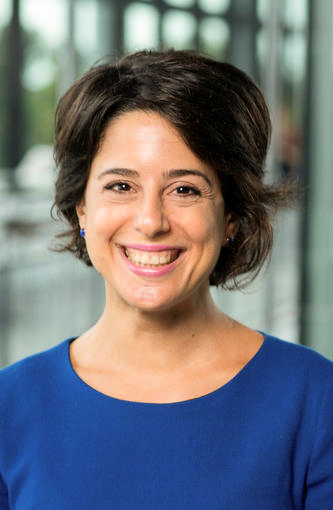
Courtesy of Yale School of Management
In one of Evans Hall’s signature cylindrical classrooms on Wednesday, a group of around 20 students huddled around a podium as food entrepreneur Greg Grinfeld delivered a guest lecture in professor Teresa Chahine’s “Introduction to Social Entrepreneurship” class. During his presentation, Grinfeld defined technology narrowly, limiting its scope to the domain of electronics.
Chahine interjected.
“Technology doesn’t mean tech,” she said. “Technology means tool, any kind of tool.”
This type of interjection is typical of Chahine, according to students and faculty at the School of Management. Chahine’s style, as she defines it, comes from her wide multidisciplinary background, which she believes characterizes her as a typical social entrepreneur.
Chahine was groomed to be a doctor, a path often prescribed to those who finish at the top of their class in her native Lebanon. She studied biological sciences, received a master’s degree in genetics and continued to dig deeper into the world of STEM. While she achieved success in the world of biology, she yearned for a more collaborative job where she can directly witness the impact of her team’s work, she said.
With this ambition in mind, she transitioned to the world of public health and obtained a doctorate from Harvard. Her goal was to take these skills to her home country, but she found that it was difficult to find a job in Lebanon where she could address social issues and simultaneously help grow the economy. So, she created her own, Chahine said.
Chahine launched a Lebanese branch of Alfanar, a regional NGO that supports social enterprises and grassroots organizations that have demonstrated an impact. Alfanar’s mission is to serve marginalized populations through education and vocational development.
In a country that felt so hopeless, Chahine said, these organizations brought her inspiration that fed her own aspirations and ultimately trickled into her role at SOM, where she is the inaugural Sheila and Ron ’92 Marcelo Lecturer in Social Entrepreneurship.
“She doesn’t just teach entrepreneurship but rather is a very much an entrepreneur in the management education world in her own right, designing innovative new course, supporting students and their social enterprises, forging links across campus and connecting us to the New Haven community in new ways,” deputy dean for executive programs David Bach ’99 told the News.
The decor in Chahine’s SOM office — complete with a massive coffee machine lugged all the way from Beirut for the sole purpose of making cardamom flavored Turkish coffee — reflects the places around the world influenced by her approach to entrepreneurship, she explained. On one shelf is a single chime adhered to a decorative block of wood engraved with the name of a Brazilian social enterprise. Other mementos include an Ecuadorian jar of honey gifted by a former student and several, several books.
When Chahine arrived in New Haven, it did not take long for her to find the Alfanar equivalent of Southern New England: City Seed, a nonprofit incubator, and Sanctuary Kitchen, a social enterprise focused on refugees. She said she began to explore the social entrepreneurship scene in New Haven when she attended an NGO fundraiser where she met other SOM colleagues engaged in local organizations.
While her outward facing colleagues may have introduced her to the movers and shakers of New Haven, she took her own approach to social entrepreneurship. She scaled it to the world beyond her own classroom through her podcast Impact Innovation, in which she unpacks social issues and highlights those fighting at the nexus of business and society.
“I see a problem; I’ll roll up my sleeves; I’ll get my hands dirty and fix it,” Chahine said.
“We aren’t McDonalds, we don’t want to serve millions, we want to eradicate [social problems] so we don’t have to serve millions.”
Chahine teaches her students to become social entrepreneurs through a 12-stage framework. She forbids preconceived notions, premeditated ideas and all forms of egos, the lecturer explained. Chahine said that social entrepreneurship is a humbling endeavor and that one must be committed to problems rather than ideas. She has counseled Uzoma Orchingwa SOM ’21 on his social enterprise dedicated to making communication to and from prisons affordable for inmates and their loved ones. Orchingwa said that Chahine helped him understand the importance of cultivating grassroots relationships in order for any social project to thrive.
Chahine has taken the call to social entrepreneurship to a global audience through what she dubs the 12-week challenge. “Introduction to Social Entrepreneurship” connects to its audience through Facebook, Twitter and her podcast. She insists that aspiring entrepreneurs do not have to be in her classroom to be a part of the conversation.
Alfanar Lebanon is based in Beirut.
John Besche | john.besche@yale.edu







